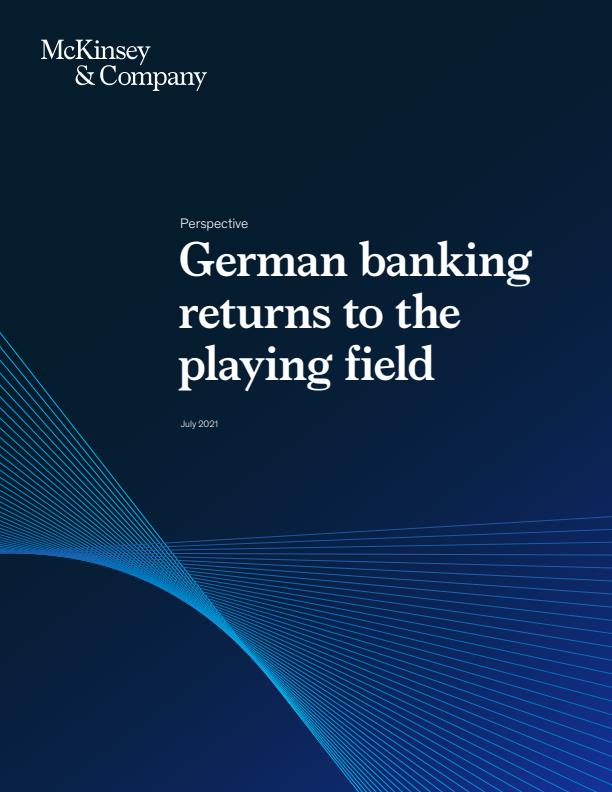For generations, Germany’s banking industry has played a central role in the country’s economy. Banks provide loans to support businesses, help families buy cars and homes, offer secure and nearly instant payments, provide products for investors, and are often considered to be highly prestigious employers in Germany.
Yet the industry has potential to improve. As fast-moving, well-funded competitors have emerged, banks are increasingly viewed as reserve-team players who no longer retain a key role in the German financial sector. Yes, banks helped stabilize and reengaged with the economy during the COVID-19 pandemic, but their public reputation is not where it could be, and the banking sector seems less relevant in the overall game plan for the German economy.
For example, German banks have lost sizable market share in terms of revenues to foreign banks, including European and US players; specialized players that operate without banking licenses; and digital attackers, including tech companies. The revenue share of German domestic incumbent banks fell from about 70 percent in 2010 to 60 percent in 2019. They still dominate retail banking with an 80 percent share but have retained only a minority of the market in investment banking and wealth and asset management, with shares of about 20 percent and 45 percent, respectively (Exhibit 1).

Would you like to learn more about our Financial Services Practice?
The vast majority of executives we interact with accept the difficulties banks are facing, and most believe that banking needs a fundamental transformation. However, this transformation may not be destined to materialize. Opinions differ widely on whether it will happen or succeed—and whether every institution needs to transform.
In sum, the industry outlook is stark. If German banking continues on its current course—assuming slightly declining revenues, a rising cost base, and risk costs below their long-term average—the future would inevitably include further market-share losses and multiple forced mergers or wind-downs of institutions while foreign and nonbanking players take over banks’ most profitable activities.
Based on this perspective, we propose a game plan to build a better-performing and healthier industry. We share five main messages—all of which are examined in detail in the full report:
- Banks remain at the heart of Germany’s economy, providing vital financial services, managing risk, and helping to pull the economy through the pandemic.
- However, the outlook for incumbent banks is not good. Without any action by banks, they would face continued market share losses and falling profits, and ROE would be on course for 0 percent by 2030. Alternatively, if banks continue to pursue and amplify current initiatives in the areas of digitization and customer centricity, they could achieve a more acceptable 3 to 4 percent ROE by 2030.
- Even if they achieve the 3 to 4 percent ROE mark, Germany’s banks will still face a shortfall of €30 billion to €40 billion in operating profit, rendering them incapable of making required investments in digitization and addressing environmental, social, and governance (ESG) concerns.
- German banks can learn from other businesses—both in banking and beyond—that have successfully transformed, even in regulated yet rapidly changing industries.
- Five improvement themes can boost operating profits (Exhibit 2):
- more responsive business strategies
- tech-enabled customer engagement
- new (digital) business building
- truly digital operating models and
- a redefinition of banking’s purpose to incorporate ESG principles


Customer experience as a value driver in German retail banking
In the full report, available for download on this page, we begin with a fact-based analysis of the situation and long-term trends in German banking and then discuss possible aspirations for banks and their stakeholders, including consumers, corporations, and employees. We conclude by identifying the most important changes that will lead to a healthier and better-performing German banking sector.
Throughout the report, we provide insights gleaned from successful transformations and interesting journeys in banking in Sweden, China, and Japan and in other industries, including energy, media, and telco. Our aim is to foster a clear-eyed, constructive, and perhaps uncomfortable debate on the future of banks and the entire banking sector in Germany across retail (including private banking), corporate, and investment banking, asset management, and payments. We base our analyses and recommendations on exclusive primary research from McKinsey & Company and several dozen touchpoints with industry leaders and representatives of the German banking sector and beyond.
We are optimistic that German banking can have a bright future. Through hard work, courage, and ambition, banks can regain the national and international relevance and prestige they once enjoyed.
Not all banks will succeed; the competition will not stand still. Specialist players, foreign banks, digital attackers, and high-tech entrants will find new ways to deliver value and meet the shifting needs of the most profitable customers, gaining ground on slower-moving incumbents.
Taking inspiration from our five improvement themes and the successes of incumbents in other banking markets and other industries, we believe German banks can deliver some quick wins, particularly in customer centricity and digitization, and that many more transformative efforts will pay off in the medium term. We believe that many key decision makers will rise to the challenge, invigorate their teams to win, and relentlessly pursue longer-term improvements.
They know that this is the moment to act, and they will succeed based on their willingness to change the way the game is played.
For a deeper dive on the findings, download the full report from which this article is extracted, German banking returns to the playing field (PDF–3.2MB).



